School of Physician Assistant Studies graduates first class in December
Lipscomb was the only school in the state to graduate their students on time in the midst of Covid-19.
Kim Chaudoin |
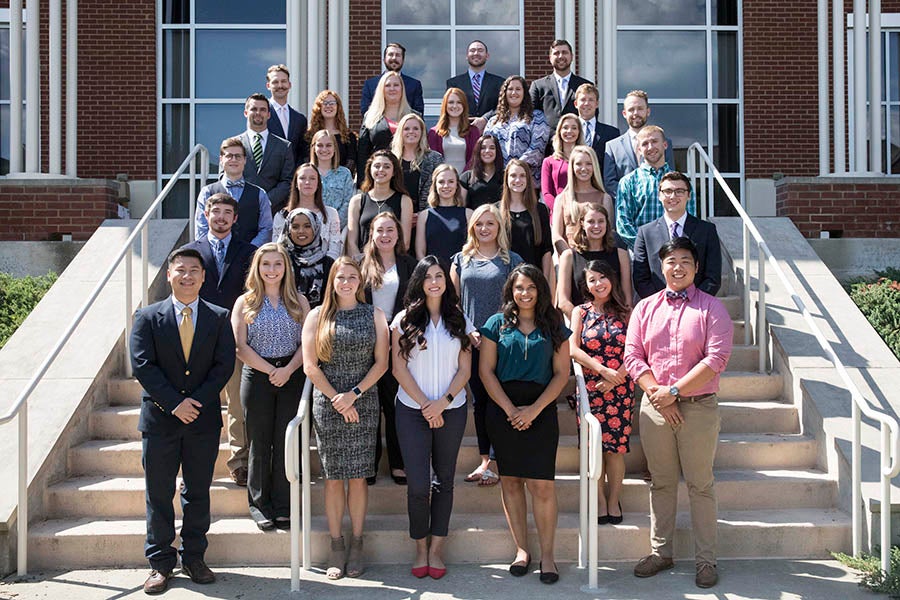
A 2018 photos of the first cohort of Lipscomb physician assistant studies students. Some members of the cohort have changed.
This original version of this story was posted on Dec. 15.
The Lipscomb community celebrated a historic milestone this fall with its first class of students in the School of Physician Assistant Studies graduating in December.
The 33 students that comprise the Class of 2020 received the first-ever Master of Physician Assistant Studies degrees awarded by Lipscomb during the virtual ceremony set for Dec. 19 at 2 p.m. CST. This cohort of students made university history in October 2018 as they were the first students to enroll in Lipscomb’s new PA school and continue to make history as its first graduates. This culminates 27 consecutive months of work, which included earning 124 academic credits and completing a rigorous clinical component.
“I am so excited about this group of health care professionals. Lipscomb has a great track record for practitioner preparation in healthcare professions and this class has followed this trajectory at the highest level,” says Dr. Quincy Byrdsong, vice provost for health affairs at Lipscomb. “This group has stayed the course and is ready to take on the rewarding work of the physician assistant, close the primary care gap in this country, and proudly walking in their commitment to a Christian life of service.”
“Additionally, their interprofessional educational experiences with other healthcare professionals will be evident in their willingness to work in comprehensive healthcare settings and their readiness to participate in collaborative care models for their patients,” he continues. “I am encouraged and confident about the tremendous impact this class will have on not only the health care industry but on the state of public health as well.”
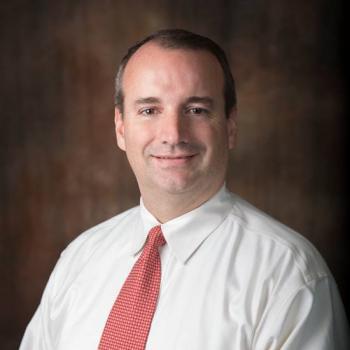
Dr. Stephen Heffington
Dr. Stephen Heffington, program director of the school, says having students graduate from the program for the first time is a significant step for the program.
“It’s easy when you are building a program to be focused on the important details of getting it off the ground, and then you step back and realize that the hard work of so many people have led us to this moment. It’s eye-opening to see that all of that work actually has an end product. It is rewarding, and it is humbling,” he says. “Having been a part of this school from the beginning, there have been several significant moments along the way. But for me personally this is the aspect of which I am most proud — graduating the first class and sending them out into the world to represent our university and our program to serve humankind.
“Until our graduates are out in the healthcare community, we haven't really done what set out to do,” continues Heffington. “Starting the program was, of course, a significant first step and then having students enroll in the program for the first time is essential. But it's accomplishing our mission of helping our students complete their degrees so they can go out and serve the kingdom that is our greatest achievement.”
With the intense nature of the program’s schedule Heffington says it prepares students well for the reality of the health care setting. Students have worked year-round since they entered the program with weekend rotations, some holiday shifts and no typical school breaks. It is intense and he realizes students will be eager to take a “deep breath” after graduation.
READ MORE: Lipscomb launches School of Physician Assistant Studies
As students have completed their clinical rotations, Heffington says the positive feedback they have received from patients and providers is satisfying.
“We have gotten feedback as our students have been out in the field on rotations and it really brings it home as we begin to not just see them as students but as healthcare providers for the first time,” admits Heffington. “When we get emails and letters with stories of how what our students did made a difference or how well they did we realize these aren't the students we interviewed three years ago for admission to the program, but that they really are becoming healthcare providers that are changing people's lives and helping people. They are helping people during the most vulnerable times of their lives.”
It’s easy when you are building a program to be focused on the important details of getting it off the ground, and then you step back and realize that the hard work of so many people have led us to this moment. ... It is rewarding, and it is humbling. — Dr. Stephen Heffington
Heffington says it is rewarding to see what students are learning in the classroom put into practice. “The knowledge and information we are teaching them is important of course,” he says. “But when you see an end product, where they're changing somebody's life, it really is rewarding. Everyday we grind through the little things to make that big picture happen. It’s good to step back and realize in the moment that it’s not so much about teaching a particular lesson. It's about growing a provider.”
Plans to launch a School of Physician Assistant Studies at Lipscomb originated in 2015. Heffington, who has more than 20 years of experience in surgical practice and health care administration, recalls conversations he had with Dr. Roger Davis, retired vice provost for health affairs and founding dean of the College of Pharmacy & Health Sciences, as the vision for the school developed. Davis established Lipscomb’s pharmacy college in 2007 and was instrumental in launching the PA program.
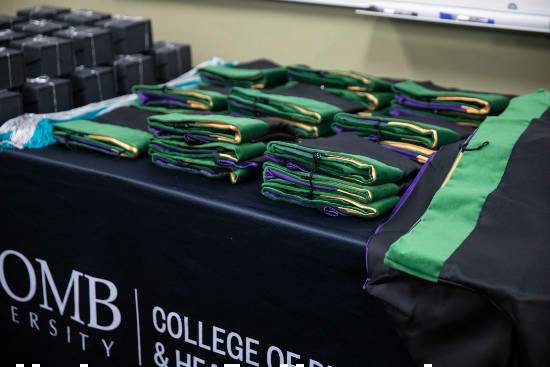
“It is very gratifying when others buy into a dream. One doesn’t get many opportunities in life to start fresh and build new programs. This first cohort has helped the institution write on a blank page the story of this new program,” says Davis. “It is professionally and personally satisfying to see people get excited about a new idea. President (Randy) Lowry and Provost (Craig) Bledsoe along with the board have been extremely supportive of the health sciences and in our launch of the PA program during my time at Lipscomb. I am also grateful to Dr. Heffington for getting this across the finish line with the program’s first graduates.”
READ MORE: New PA School receives provisional accreditation
Although he retired from Lipscomb in spring 2020, Davis says he is pleased to celebrate this moment in the program’s history and looks forward to watching the impact the first graduating class will have.
“This is a phenomenal cohort of students who are intellectually prepared, are compassionate and are passionate about serving patient needs,” he says. “I couldn’t be more proud of the success of this class both as individuals and as a group. They are prepared to make a difference in their communities, especially in the midst of the global pandemic they are poised to play a big role in serving others.”
Lipscomb's program is built on several distinctives. Faculty is at the heart of the program. Heffington uses the word “family” to describe the relationships forged between faculty and students in the school.
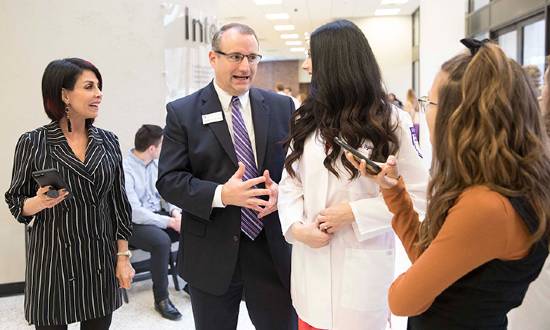
“Our goal is to make you the most complete person we can through education, mentoring and in being a community,” he explains. “We want the time our students are in the program to be the beginning of a lifelong relationship journey, where they always consider themselves part of the Lipscomb community. This is their home long after they have left our campus.”
READ MORE: White coat ceremony celebrates milestone for Lipscomb's first PA cohort
The school’s location in Nashville, one of the nation’s biggest healthcare hubs, provides countless convenient opportunities for rotations and rich resources from which to learn.
Perhaps the aspect of Lipscomb’s program that sets it most apart is its faith-based mission. “We are focused on training students to become physician assistants who will provide compassionate healthcare to a diverse patient community,” says Heffington. “We want our students to view their work through the lens of vocational mission. To use their knowledge and skills to serve others. All students will do a rotation in a medically underserved area. We have had two mission trips to Honduras and will expand mission and services opportunities in the future.” In addition, PA students have conducted flu vaccine clinics in the community and will assist with COVID-19 vaccination distribution in the near future.
Lipscomb’s School of Physician Assistant Studies continues to grow as it has admitted three cohorts, which have grown to about 50 students each, is housed in a state-of-the-art facility and has received Accreditation-Provisional status from the ARC-PA. The next step is for its graduates to sit for the PANCE, the Physician Assistant National Certification Exam, and Heffington says his goal is a 100% pass rate.
Want to know more about Lipscomb’s School of Physician Assistant Studies? Visit www.lipscomb.edu/paschool.
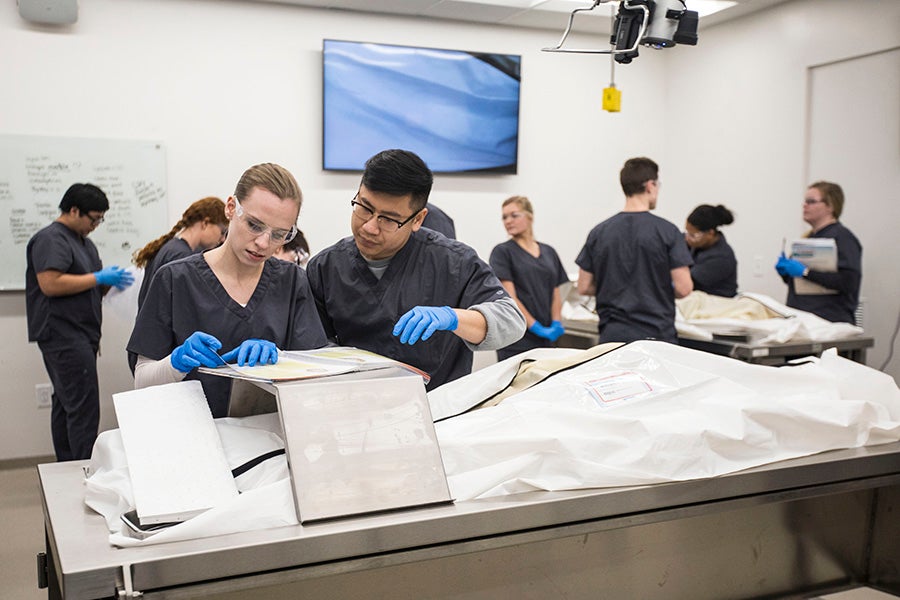
A new cutting-edge anatomy lab was constructed for use by the physician assistant students and other students in the health sciences.
— Photos by Kristi Jones